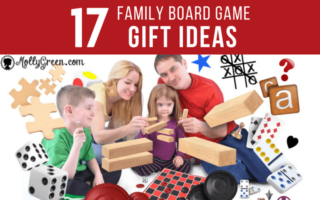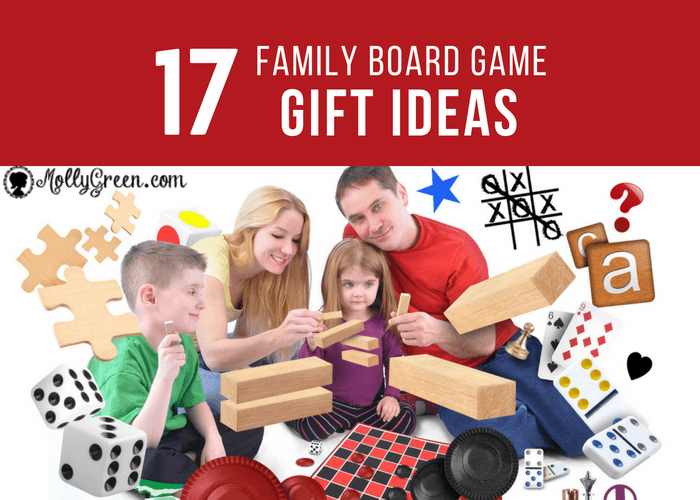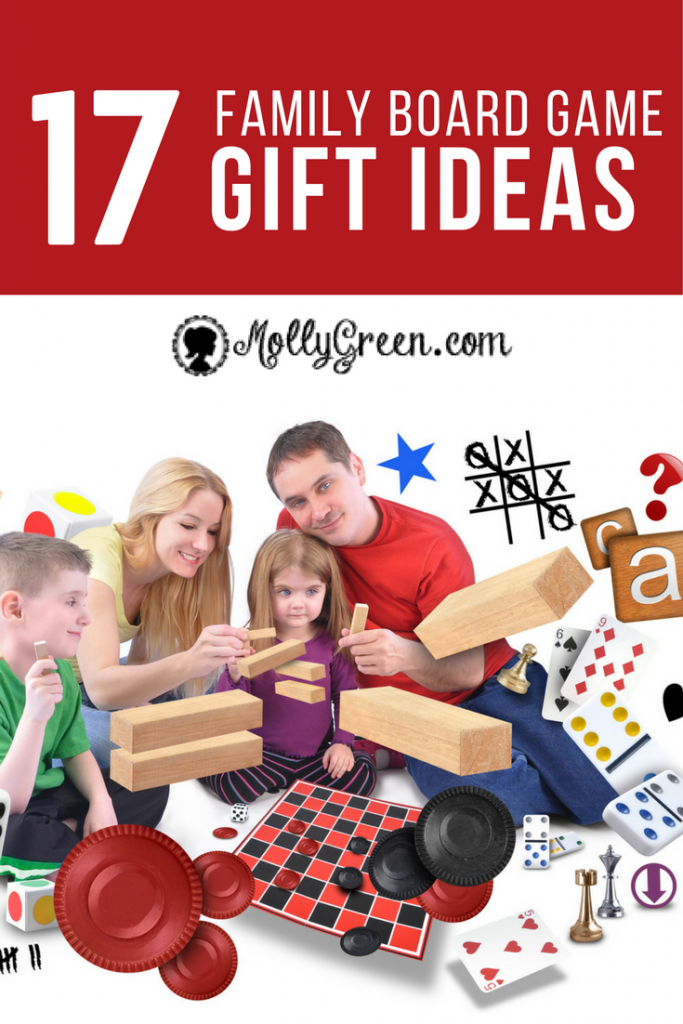Are you in a rut or stuck on gift ideas for friends or family? Seriously, you can NEVER go wrong when you look to some of the best family board games. Most board games encourage creative and strategic thinking, lots of laughter and (hopefully!) friendly competition. They’re also a great way to spend quality time together making memories.
Here are 17 of the BEST family board games:
1. Apples to Apples
The object of the game is to win the most rounds by playing a “red apple” card (which generally features a noun) from one’s hand to best “match” that round’s communal “green apple” card (which contains an adjective) as chosen by that round’s judging player. The game is designed for four to ten players and played for 30–75 minutes. Age Range is 12 and up.
2. Bananagrams
Fast and frantic, players race against each other to build crossword grids. In this addictive word game, speed wins, not points. You’ll have a bunch of fun as you race to the finish by using all of your letter tiles first! BANANAGRAMS comes in a small portable banana-shaped pouch and is perfect for everyone 7 and up; at home or on the go. For 1-8 players.
3. Boggle
For 2 or more players, ages 8 and up. The game begins by shaking a covered tray of 16 cubic dice, each with a different letter printed on each of its sides. The dice settle into a 4×4 tray so that only the top letter of each cube is visible. After they have settled into the grid, a three-minute sand timer is started and all players simultaneously begin the main phase of play.
Each player searches for words that can be constructed from the letters of sequentially adjacent cubes. Words must be at least three letters long, may include singular and plural (or other derived forms) separately, but may not use the same letter cube more than once per word. Players record their words and after three minutes have elapsed, all players must immediately stop writing and the game enters the scoring phase.
4. Chinese Checkers
Chinese Checkers is a board game of German origin which can be played by two, three, four, or six people. The objective is to be first to race one’s pieces across the board into “home”—the corner of the star opposite one’s starting corner—using single-step moves or moves that jump over other pieces. Like other skill-based games, Chinese Checkers involves strategy. The rules are simple, so even young children can play.
5. Clue
The object of Clue is to determine who murdered the game’s victim, where the crime took place, and which weapon was used. Each player attempts to guess the correct answer by strategically moving around the game board representing rooms of a mansion and collecting clues about the circumstances of the murder from the other players. For 2-6 players, ages 8 and up.
6. Dominoes
Dominoes is a game played with rectangular “domino” tiles. The domino gaming pieces make up a domino set, sometimes called a deck or pack. The most typical domino games are layout, blocking, or scoring games. The traditional domino set consists of 28 pieces. Other games using domino sets are often adaptations of card games. Wikipedia has a good list of the different types of domino games here.
7. Guess Who?
Guess Who? is a two-player guessing game. Each player starts the game with a board that includes cartoon images of 24 people and their first names with all the images standing up. Each player selects a card of their choice from a separate pile of cards containing the same 24 images.
The object of the game is to be the first to determine which card one’s opponent has selected. Players alternate asking various yes or no questions to eliminate candidates, such as “Does this person wear glasses?” The player will then eliminate candidates by flipping those images down until all but one is left. Well-crafted questions allow players to eliminate one or more possible cards.
8. Hedbanz
Hedbanz is the goofy quick-question game of “What Am I?” Players wear a “picture card” in their headband, and then quickly ask questions to figure out what they are. “Am I food?” “Am I a vegetable?” “Am I ketchup?” When they figure it out, they get rid of a chip; first player to get rid of all three of their chips wins! For 2 to 6 players, ages 7 and up.
9. Jenga
Jenga is a game of physical and mental skill. Built on the simple premise of stacking blocks, Jenga engages players of all ages, across all cultures. Players take turns to remove a block from a tower and balance it on top, creating a taller and increasingly unstable structure as the game progresses.
10. The Game of Life
Live the life you want by choosing your path for a life of action, adventure, and unexpected surprises. Will you receive a fortune and lose it as quickly as you got it? Will you choose the longer college path toward a high-paying job or choose a trade right away to get paid sooner? Will you express your creativity as an inventor or dancer, or become a veterinarian to help animals?
Whatever you choose, you never know what ups and downs you’ll encounter along the way. Once everyone reaches the end of the game at retirement, everyone pays their debts and adds up their wealth. The player with the most money wins the game. For 2 to 4 players, ages 8 and up.
11. Pie Face
Just put some delicious whipped cream from home or the wet sponge on the “hand” of this hilarious game unit and start turning the handles. It could go off at any time, so keep your fingers crossed and hope you’re not the one who gets a splat in the face! You score a point for every time you turn the handle without getting pie-faced, and the one who scores 25 points wins. For 2 or more players, ages 5 and up.
12. Qwirkle
Qwirkle is playable from early ages up, so is one of the best family board games for young children and older individuals alike to develop and hone their spacial recognition, planning, and problem solving skills. Plan, win, and learn simultaneously! It only takes a few moments to explain, so new players such as extended family or your child’s play dates can jump right in and play.
13. Scrabble
In 1933 an out of work architect named Alfred Mosher Butts invented a game that would lift the spirits of millions. Read more about the fascinating history of Scrabble here. Scrabble is a word game in which two to four players score points by placing tiles, each bearing a single letter, onto a game board which is divided into a 15×15 grid of squares. The tiles must form words which, in crossword fashion, flow left to right in rows or downwards in columns. The words must be defined in a standard dictionary.
14. Sequence
A fun card game of strategy, easy enough for children and challenging enough for adults, making it a family game night favorite for generations. The object of Sequence is to form rows of 5 poker chips on the board by placing the chips on the board spaces corresponding to cards played from your hand. For 2-12 players, 7 years and up.
15. Sorry!
Sorry! is a board game based on the ancient cross and circle game Pachisi. Players try to travel around the board with their pieces faster than any other player. The game title comes from the many ways in which a player can negate the progress of another, while issuing an apologetic “Sorry!” For two to four players, ages six through adult.
16. Trouble
This fun game is easy to learn and play. The goal is to be the first to send all your men around the track without getting into trouble. Pieces are moved according to the roll of a die. Ideal for two to four players ages 5 and older.
17. Yahtzee
Yahtzee is the classic dice game with a unique combination of luck and strategy and should be included on every list of the best family board games. Every game is an exciting challenge to rack up the highest score. The object of the game is to score points by rolling five dice to make certain combinations. The dice can be rolled up to three times in a turn to try to make various scoring combinations. Seriously high scores come from multiple Yahtzee bonus points, but your luck could change with every roll! For 2+ players, ages 8 and up.
Well, now that you have a good list to choose from…get to shopping! We know there are more fun family games than we’ve profiled here. What games would you add to our list?






